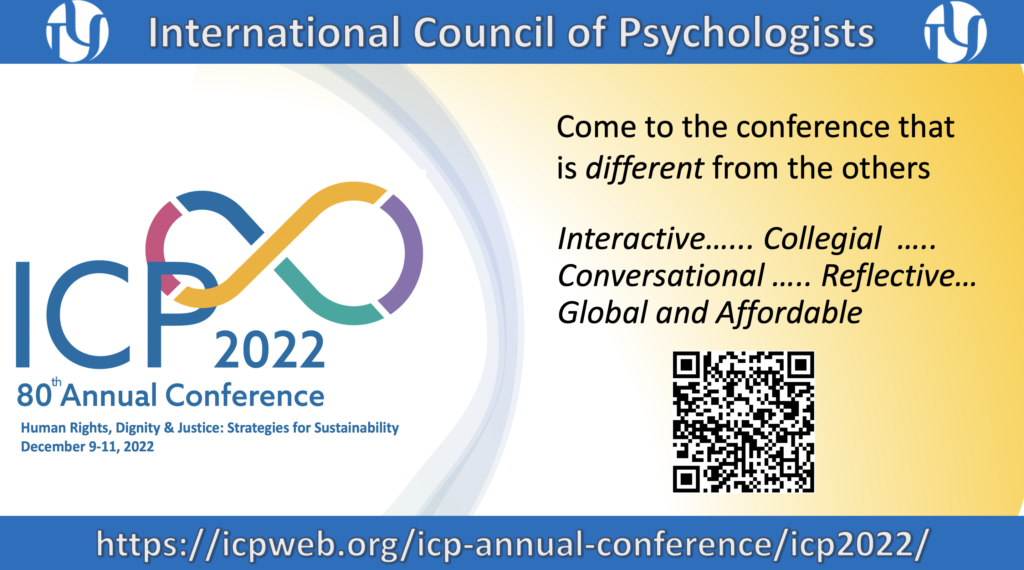
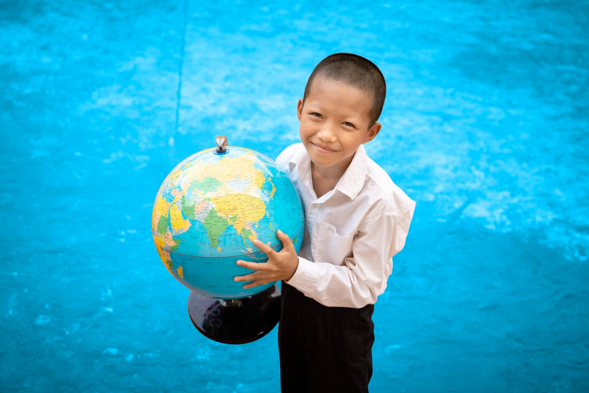
Editor’s Note
The focus in this month’s Bulletin is the World Children’s Day, 20 November.
Table of Contents
SPECIAL SECTION

Editor’s Note: Special Section on World Children’s Day
Editor’s Note
The focus in this month’s Bulletin is the World Children’s Day 20 November. World Children’s Day is UNICEF’s annual day of action for children, by children. From climate change, education and mental health, to ending racism and discrimination, children and young people are raising their voices on the issues that matter to their generation and calling for adults to create a better future.
This World Children’s Day, it’s more important than ever that the world listens to their ideas and demands. On 20 November, kids will stand up for a more equal, inclusive world.
What will you do?
In 1989, world leaders made a historic commitment to the world’s children by adopting the United Nations Convention on the Rights of the Child – an international agreement on childhood.
It’s become the most widely ratified human rights treaty in history and has helped transform children’s lives around the world. But still not every child gets to enjoy a full childhood. Still, too many childhoods are cut short. It is up to our generation to demand that leaders from government, business and communities fulfil their commitments and take action for child rights now, once and for all. They must commit to making sure every child, has every right.
GNPHR Webinar Series – Children’s Human Rights and Psychology
November 21, 2022 – 10 am EDT, 4 pm CET
Playing together: children’s human rights and psychology, with Kerstin Söderström and Ragnhild Dybdahl. Register here
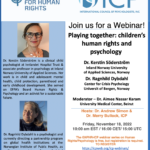
Expanded Safety Net Drives Sharp Drop in Child Poverty
Jason DeParle, NY Times, September 11, 2022.
For a generation or more, America’s high levels of child poverty set it apart from other rich nations, leaving millions of young people lacking support as basic as food and shelter amid mounting evidence that early hardship leaves children poorer, sicker and less educated as adults.
But with little public notice and accelerating speed, America’s children have become much less poor.
A comprehensive new analysis shows that child poverty has fallen 59 percent since 1993, with need receding on nearly every front. Child poverty has fallen in every state, and it has fallen by about the same degree among children who are white, Black, Hispanic and Asian, living with one parent or two, and in native or immigrant households. Deep poverty, a form of especially severe deprivation, has fallen nearly as much.
By Michael G. Wessells and Kathleen Kostelny. Chapter in N. Rubin and R. Flores (eds) Cambridge Handbook of Psychology and Human Rights, 2019
[from the summary] “The UN Convention on the Rights of the Child guarantees comprehensive rights to all children (people under 18 years of age). These entitlements, which states cannot take away, are essential for children’s protection, healthy development, participation, and agency, and they also provide a moral compass for working with children. Because child rights often exist more on paper than in reality, it is important to develop strategies for realizing children’s rights. With an emphasis on settings of armed conflict, useful strategies include learning from children’s lived experiences, enabling children’s agency and decision-making power, education about child rights in a way that fits the local context, social mobilization and empowerment, social norms changing harmful practices, international influencing and enforcement of international law, and reporting of violations and whistleblowing, among others. Child rights and psychology have interrelated agendas, since both seek to promote human well-being, including children’s well-being. The chapter concludes that psychologists will achieve their mission of enabling human well-being only if they make child rights central in their own work.”
Children in School
For What and for Whom? Ethical and Political Commitments for Psychology in Brazil. Raquel S. L. Guzzo. Chapter in Koller, S. (ed) Psychology in Brazil. Springer, Cham. https://doi.org/10.1007/978-3-030-11336-0_9, Springer, 2019
[from the abstract}… This chapter reviews Psychology in Education in Brazil. Psychology in Education has an important role for integral development of children in the school space, together with teachers and families. This field, which integrates the educational process and the community insertion, brings a challenge to Psychology. From a historical-critical perspective and the theoretical and methodological foundations of action–participation research, the commitment to this production is to ensure the right of all children to fully develop to the fullest of their potentialities.
Fee Ziemes, J., & Gutzwiller-Helfenfinger, E. (2019). European Psychologist, 24(2), 169–179.
[from the abstract] …This article aims to connect notions of human and children’s rights with concepts of educational psychology to illustrate the interdependence of normative and descriptive frameworks. We use Martha Nussbaum’s capability approach as an operationalization to move from a normative legal framework toward concrete research topics and practices within educational and school psychology. According to the Convention on the Rights of the Child, children have the right to feel safe, learn, participate, and form an identity. We argue that educational psychology can help to specify these normative postulations of the CRC and aid the implementation of positive rights.
Readings on Children’s Rights
International Handbook on Child Rights and School Psychology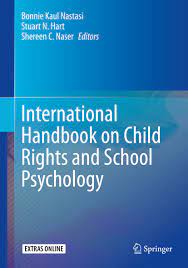 . Bonnie Kaul Nastasi, Stuart N. Hart, Shereen C. Naser, Springer, 2020
. Bonnie Kaul Nastasi, Stuart N. Hart, Shereen C. Naser, Springer, 2020
Explores the transformative potential of a child-rights approach for school psychology. Synthesizes the major themes of the United Nations Convention on the Rights of the Child (CRC) in context of the roles and responsibilities of school psychologists. Provides an ecological-developmental conceptual foundation for understanding the CRC. Proposes future directions for achieving a child-rights approach for school psychology.
GNPHR NEWS AND EVENTS
GNPHR releases statement on Reproductive Rights
GNPHR STATEMENT ON REPRODUCTIVE RIGHTS
November, 2022
Approved by the Steering Committee of the Global Network of Psychologists for Human Rights (GNPHR)
The Universal Declaration of Human Rights guarantees to all people the rights to health, to self-determination, bodily integrity. The Convention on the Elimination of All Forms of Discrimination against Women affirms this by explicitly recognizing women’s reproductive rights.
The willful denial of a woman’s right to determine the fate of her own body explicitly removes these human rights.
There is a plethora of psychological research calling attention to the close connections among reproductive rights, mental health, and wellbeing (see for example Chrisler and Sagrestano “Reproductive Rights, Psychology and Human Rights” https://www.cambridge.org/core/books/abs/cambridge-handbook-of-psychology-and-human-rights/reproductive-justice-psychology-and-human-rights/775C4735A73C9FBFF669D42870583DBD or The State of Reproductive Health: Mental Health, Inequity, and Access https://www.apa.org/pi/women/reproductive-health-rights).
Therefore, the Global Network of Psychologists for Human Rights
- Supports statements made by the United Nations and its associated bodies in support of reproductive rights (e.g., Statement by UN Secretary-General: https://www.reuters.com/world/reproductive-rights-foundation-empowerment-women-girls-says-un-2022-05-03/; UN Human Rights Commission: https://www.ohchr.org/en/node/3447/sexual-and-reproductive-health-and-rights ;
- Supports statements made by the United Nations Office of Human Rights in support of access to safe abortion (https://www.ohchr.org/sites/default/files/Documents/Issues/Women/WRGS/SexualHealth/INFO_Abortion_WEB.pdf)“Human rights bodies have provided clear guidance on the need to decriminalize abortion. Ensuring access to these services in accordance with human rights standards is part of State obligations to eliminate discrimination against women and to ensure women’s right to health as well as other fundamental human rights.”
- Supports statements made by Human Rights Watch in their analysis “Access to Abortion is a Human Right” (https://www.hrw.org/news/2022/06/24/access-abortion-human-right)
- Supports statements made by Amnesty International concerning the violation of human rights when abortion is criminalized (https://www.amnestyusa.org/wp-content/uploads/2022/02/human-rights-standards.pdf)“Criminalizing Abortion Violates Human Rights … Respect for the autonomous decision-making of women, girls and all those who can become pregnant in laws and policies that affect their lives is a key indicator of the degree of gender equality achieved. Laws that do not place pregnant people at the center and do not respect their autonomous decision making and human rights cause harm to all women, girls and others who can become pregnant, and in particular to people who are marginalized and/or otherwise face intersecting forms of discrimination.”
- Supports the UN Women Statement: Reproductive rights are women’s rights and human rights (24 JUNE 2022) “Reproductive rights are integral to women’s rights, a fact that is upheld by international agreements and reflected in law in different parts of the world. To be able to exercise their human rights and make essential decisions, women need to be able to decide freely and responsibly on the number and spacing of their children and to have access to information, education, and services….”
- Supports statements from faith-based groups supporting reproductive rights as human rights and religious freedom, such as the Religious Coalition for Reproductive Choice (https://rcrc.org/mission-statement/) or the Moslems for Reproductive Rights: https://www.mpvusa.org/reproductive-justice
- Supports the claim that denying women the right to choose to have safe and accessible abortion can result in cruel, inhuman and degrading treatment that is prohibited by international law (https://www.corteidh.or.cr/tablas/r33546.pdf)
- Supports the 2014 Declaration on sexual rights: https://worldsexualhealth.net/wp-content/uploads/2013/08/Declaration-of-Sexual-Rights-2014-plain-text.pdf article 12 “The right to decide whether to have children, the number and spacing of children, and to have the information and the means to do so”.
Psychology Organizations and Human Rights
The Network of Human Rights Groups in Psychology Associations is open to representatives of psychology associations that have established a committee, office, or subgroup focused on psychology and human rights. If you are interested in joining the group please register your interest here https://humanrightspsychology.org/home/about/interest-form-gnphr-working-group/
GNPHR Webinar Series – Human Rights and Psychology
View all webinars in series here https://humanrightspsychology.org/webinarseries
CONTENT AREAS AND NEWS
General
Homo Dignita. Theory and Practice of Human Rights. Zafarullah Khan, Pakistan Law House, Islamabad 2019. Dedicated to: The Wretched of the Earth
This book presents a broad analysis of human rights concepts, processes, institutions and systems. It examines the human rights achievements that now form part of national and international legal, political and moral landscape. The central object of the book is to have a standard textbook on human rights that could educate readers in a proper context. The focus is on legal materials exploring intricate relationship among law, politics and morality. It relies on resolutions, debates, reports, decisions and other acts of inter-governmental assemblies, commissions and committees as well as of non-governmental organisations. The book quotes case law also because the role of the courts is central in protecting human rights and developing human rights ideals.
“The Human Rights movement as such is a relatively new phenomenon though the Holy Quran declared more than fourteen hundred years ago: ‘We have honoured the Children of Adam and carried them on land and sea, and provided them with good things, and preferred them greatly over many of those We created’ (The Quran: 17:70) and Omar-bib-Khattab (d. 644) thundered, ‘Why have you enslaved the people when they were born by their mothers free?’. Rousseau truly lamented in ‘Social Contract (1762) that ‘Man is born free, but he is everywhere in chains’.
However, the ideals of the human rights now have become a significant part of modern human consciousness, a universal discourse, a potent rhetoric and aspiration. “
How tuning psychology to the real needs of people: Contribution for the process of facing adverse living conditions. Raquel Guzzo, PUC-Campinas, Academia Letters, August 2021.
[from the abstract] …Considering that Psychology in Latin America a colonized profession and science, the challenge has been to promote actions and knowledge that enable the confrontation of people and groups to the adverse conditions of life, as well as to strengthen the social organizations that militate for the conquest of basic rights. The Critical and Community Perspective of Psychology presented by Tod Sloan’s work, his commitment to the development of organized and strong people and groups has been the path we have sought to develop. Challenges to be overcome within and outside the profession in Brazil make the absence of Tod intense and irreparable and his work an indispensable instrument for those who desire Psychology as an scientific, politic and professional instrument to be at the service of the real needs of people and groups.
“We Are Not Alone”: Legacies of Eugenics in Education and Society. Nazlin Bhimani, co-authored with Professor Marius Turda, UCL, UK, October 2022.
The title of the exhibition, “We are Not Alone” is inspired by a widely circulated Nazi eugenic poster from the mid-1930s. After the introduction of the 1933 ‘Law for the Prevention of Hereditarily Diseased Offspring’, Nazi propagandists claimed that their eugenic programme of forced sterilisation was in no way different to provisions already existing in the penal legislation of countries such as the USA and Sweden, and which was about to be introduced in other European countries such as Britain, Hungary, and Poland. ‘We are not alone’, they said, hoping to garner international support for their plans to eliminate ‘defectives’ from society and to ‘purify the race’.
Eugenics was a global movement. The exhibition highlights this aspect, providing historical examples from Britain, USA, Italy, Sweden, and Romania, whilst recognising that eugenics programmes targeting individuals with mental disabilities and ethnic minorities were not stopped after 1945. They continued during the post-World War II period in countries as diverse as the USA, Scandinavia, Japan, Czechoslovakia, and Peru. The exhibition aims, therefore, to offer a historically informed account of our eugenic past, present, and future, balancing various elements of continuity and discontinuity, of idiosyncrasy and similarity between eugenic movements across the world.
The internationalisation of eugenics reflected a general appreciation in many parts of the world that science was the sufficient and necessary foundation for the long-awaited renewal of the human race. As a self-styled scientific theory of human betterment and planned breeding, eugenics was based on the principle that people who were deemed socially and biologically ‘unworthy’ of reproduction should be excluded.
Climate Justice
COP27 is a Golden Moment for Middle East and North Africa to Confront Climate Crisis
With COP27 in Egypt and COP28 planned for the United Arab Emirates in 2023, this is a golden moment for the countries of the MENA region to connect climate action to broader economic and security priorities. Policy makers must take full advantage of the first of two consecutive COPs in the region to discuss with international alliances all possibilities of cooperation. Given the facts that MENA is one of most vulnerable regions affected by heat waves, rising sea levels, and sand storms, there is no time left to leave off solutions on the shelf. EARTHDAY.ORG
Climate and Health Linkages Come to the Fore Ahead of COP 27
SDG Knowledge Hub
The Lancet Countdown published a report warning that the world’s “persistent fossil fuel addiction is amplifying the health impacts of climate change, … compounding the concurrent energy, cost-of-living, food, and COVID-19 crises.” According to the World Meteorological Organization’s (WMO) latest analysis of climate observations, fossil fuel combustion and cement production were the two main causes of atmospheric carbon dioxide levels reaching 149% of the pre-industrial level in 2021.
Issued on 23 October, the 2022 report of the Lancet Countdown on health and climate change themed, ‘Health at the Mercy of Fossil Fuels,’ tracks the relationship between health and climate change across 43 indicators in five domains.
How Young Climate Activists are Changing International Human Rights Law
Greater recognition in general has been given to the importance of young people’s concerns on climate crisis over the past few years. And young activists have long been working to secure environmental change.
Urgent Need to Respect Human Rights in All Climate Change Action
GENEVA (4 November 2022) – UN independent experts* today called on States to fully integrate human rights standards and principles in negotiations during the 27th Conference of the Parties to the UN Framework Convention on Climate Change (COP27) starting in Egypt on Sunday.
…”Climate change is negatively impacting the full and effective enjoyment of the human rights enshrined in the Universal Declaration of Human Rights and other international human rights instruments. Climate change is having a major impact on a wide range of human rights today, affecting mostly marginalised groups, and could have a cataclysmic impact in the future, unless ambitious actions are undertaken immediately.
Among the human rights being threatened and violated are the rights to life, adequate food, safe drinking water and sanitation, the enjoyment of the highest attainable standard of physical and mental health, including sexual and reproductive health, adequate housing, self-determination, just and favourable conditions of work, development, the right to a clean, healthy and sustainable environment and livelihoods, as well as the right to education and cultural rights. Climate change is also contributing to human rights violations with specific adverse impacts on women and girls and against groups in marginalised situations, such as migrants, minorities, indigenous peoples, people of African descent, older persons and persons with disabilities including albinism. Climate change is exacerbating the risk of other human rights violations, including violence against women and girls, trafficking in persons, especially women and children, excessive use of force in the context of policing climate rallies and protests, racism and discrimination. Systemic racism and contemporary legacies of colonialism negatively impact the right to a healthy environment and therefore continue to have an impact on the right of everyone to the enjoyment of the right of the highest attainable standard of physical and mental health. Lawyers and others working to address climate change face abuse, threats to their lives, and other risks. Climate change is also a major driver of forced displacement and renders the search for durable solutions significantly more challenging.
States have taken important steps to recognise the right to a clean, healthy and sustainable environment (which includes the right to a safe climate) as a human right, most recently in General Assembly resolution 76/300 of 29 July 2022. It is time for States to act on their obligations.
Crimes against humanity
U.S. Releases Guantánamo’s Oldest Prisoner. Carol Rosenberg, NY Times, October 29, 2022.
GUANTÁNAMO BAY, Cuba — The United States has released the U.S. military’s oldest prisoner of the war on terror, a 75-year-old businessman who was held for nearly two decades as a suspected sympathizer of Al Qaeda but was never charged with a crime.
The man, Saifullah Paracha, a former legal resident of New York, was one of Guantánamo’s most unusual and better known “forever prisoners.” Military prosecutors never sought to put him on trial, but review panels considered him too dangerous to release until last year.
His transfer, in a secret military mission announced by the Pakistani government on Saturday, culminated months of negotiations to arrange his return. The Pentagon declined to comment. It was not known if Biden administration officials imposed any security restrictions on Mr. Paracha, but a lawyer swiftly released a photo of the former prisoner sitting in a McDonald’s in Karachi, Pakistan.
Mr. Paracha arrived at Guantánamo in the early days of detention operations, when hundreds of young men captured abroad filled cellblocks at the seafront compound.
Just before he left, the 21st commander of prison operations, a National Guard general from Michigan, had taken charge and the detainee population had dwindled to three dozen. Of them, 21 have been approved for transfer to the custody of another country with security arrangements that satisfy the secretary of defense; for example, participation in a rehabilitation program.
Decolonization / Indigenization
Karipuna people request for help
Facing invasions and government omission, Karipuna people take “a request for help” to countries and international bodies*. Conselho Indigenista Missionário, September 2022. “We came here to ask for help, help. We ask you to help us hold the Brazilian State to account for it to enforce the country’s highest law and protect our territory”. This was the appeal that Cacique André and other leaders of the Karipuna Indigenous Land (TI) in Rondônia took to embassies and representatives of 21 countries between September 19 and 23.
Prevented from circulating in their own territory, the Karipuna see the invaders advance with impunity, opening up pastures on their land. In addition to the embassies and the Delegation of the European Union in Brazil, the delegation of 13 indigenous people – among elders, adults and children – also participated in meetings with parliamentarians, MPF, Funai, Sesai and the UN.
Statement on the Emergency Situation Facing Indigenous Peoples in Brazil, by the NGO Committee on the Rights of Indigenous Peoples, NGO committee on the rights of indigenous peoples.
This statement is the outcome of a meeting held by the NGO Committee on the Rights of Indigenous Peoples (CRIP) on September 15, 2022 with President Syratã of the Pataxó Council of Caciques from the territories of South Bahia, NE Brazil, following an urgent formal request by all indigenous organizations representing the 245 Originary Peoples of Brazil. The request was catalyzed by the alarming increase in armed intimidation and enforced displacement of their leaders and communities in the region (and in the Brazilian Amazon) during the past two months by militia organized by illegal squatters, and the recent murder of a Pataxó child.
The NGO Committee on the Rights of Indigenous Peoples includes representatives of Indigenous Peoples’ international Non-Governmental and Community-Based Organizations. An important mission of this Committee is to promote respect for and implementation of the United Nations Declaration on the Rights of Indigenous Peoples (UNDRIP), and to educate the international community about the concerns and issues facing Indigenous Peoples. In line with our mission, we want to raise awareness of the magnitude of the current situation facing the Indigenous peoples of Brazil and issue a call for action to the international community.
Since 2018, President Bolsonaro’s government has defunded or paralyzed all of Brazil’s institutional mechanisms for monitoring illegal mining and deforestation and protecting the Rights of its Indigenous Peoples. The motivation for this government’s controversial political project is revealed by two parliamentary bills, (PL490 and PL191) which, if passed by the Senate will make illegal all settled indigenous Land Reclaims since 1988, and open up all their lands to huge industrial projects. The genocidal and ecocidal effects of these laws are unambiguously revealed in the poisoned rivers and lands of indigenous peoples, forcing them to beg and seek non-traditional medicine in the peripheries of nearby cities, where according to President Bolsonaro, they can “become human and claim their right to citizenship”.
In this context, indigenous peoples have peacefully entered their traditional lands to accelerate the process of demarcation by the National Indian Foundation (FUNAI), slowed by bureaucracy and political interests, and Self-Demarcated their boundaries. The illegitimate ‘squatter’ farmers resist by hiring mercenaries (recently revealed by Bahia state journalists to include Military Police), to intimidate and even murder. This is expected to increase with the approach of the forthcoming Presidential and Parliamentary elections, as the Bolsonaro government seeks to present and justify its political, social and economic vision.
Under these grave circumstances, we stand in solidarity with the Pataxó Council of Caciques, and support their letter of requests to the Brazilian government, which includes requests for a guarantee of their territorial rights, a full criminal investigation into the murder of the Pataxó child, Gustavo Silva da Conceição, and the assurance of security in their villages under impartial supervision of State institutions and the Council of Chiefs(See letter accompanying this statement).
The UNDRIP, adopted by the General Assembly in 2007, states that indigenous peoples are entitled to all human rights recognized in international law, and includes the right to remain distinct and pursue their own priorities. However these rights are increasingly being violated by the state, despite the fact that Brazil signed UNDRIP and the International Labour Organisation Convention 169 on Indigenous and Tribal Peoples.
We strongly urge member states to reaffirm and recommit to fulfilling the objectives and commitments outlined in the UNDRIP, and to bring international pressure to bear and take urgent action to protect the indigenous peoples in Brazil who are facing grave and imminent danger. In the weeks leading up to the forthcoming elections, this would send a powerful message to Brazil’s current and future federal governments that the rights of indigenous peoples enshrined in the Brazilian Constitution are protected by international law.
Roberto Borrero, Chair, NGO Committee on the Rights of Indigenous Peoples
Executive Committee members: Daniel LeBlanc, Elaine Congress, Sandra Sheridan, Rick Chavolla, Joseph Wronka.
Inclusion, Exclusion, Racism
RACISM
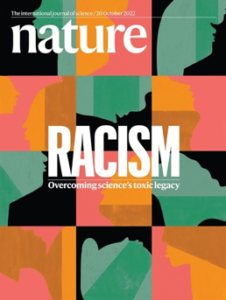 Overcoming science’s toxic legacy
Overcoming science’s toxic legacy
A Nature special issue. 20 October 2022
Science is “a shared experience, subject both to the best of what creativity and imagination have to offer and to humankind’s worst excesses”. So wrote the guest editors of this special issue of Nature, Melissa Nobles, Chad Womack, Ambroise Wonkam and Elizabeth Wathuti, in a June 2022 editorial announcing their involvement.
Among those worst excesses is racism. For centuries, science has built a legacy of excluding people of colour and those from other historically marginalized groups from the scientific enterprise. Institutions and scientists have used research to underpin discriminatory thinking, and have prioritized research outputs that ignore and further disadvantage marginalized people.
Nature has played a part in creating this racist legacy. After the killing of George Floyd by police in Minneapolis, Minnesota, in 2020, Nature committed to becoming an agent of change, and helping to end discriminatory practices and systemic racism.
This special issue is part of that commitment, and the first in this journal’s history to be guest-edited. It can only scratch the surface of such a vast topic, and will be followed by others that examine different facets of racism in science — to help build a future in which all people can participate in and benefit from the shared experience that is science.
Witnessing racism
In the minds of many who do not experience it day to day, racism consists of egregious acts of violence or abuse. But that is only part of what many people experience in science.
It is also, in the words of Black geoscientist Martha Gilmore, a “persistent current in everyday interactions” — of belittlement, of denial of opportunity, of feeling that you do not belong. Those are persistent themes in this series of profiles, in which Gilmore and four other Black and Indigenous researchers tell of their personal experiences of discrimination.
Editorial, Melissa Nobles, Chad Womack, Ambroise Wonkam and Elizabeth Wathuti.
Ending racism is key to better science: a message from Nature’s guest editors. This special issue is our ‘message in a bottle’ from the troubled ship of science. We urge readers to find it. Open it. Act on its contents. In 1768, the UK Royal Society commissioned a research ship, HMS Endeavour, to sail to Tahiti in time to witness a transit of Venus across the Sun. But, as researchers later discovered, the UK government and the society had an extra purpose for the voyage: the ship’s captain, James Cook, had been given secret instructions to continue onwards in what became Britain’s colonial takeover of Australia and New Zealand. Read further: https://www.nature.com/articles/d41586-022-03247-w
Mental Health and Human Rights
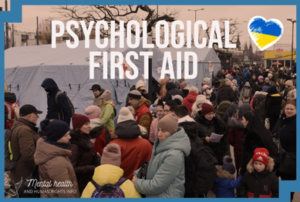 MHHRI psychological first aid and Ukrainian resources. Mental Health and Human Rights Info, 2022.
MHHRI psychological first aid and Ukrainian resources. Mental Health and Human Rights Info, 2022.
We have here gathered some of the resources that we have used in our work together with AHALAR, in Ukraine over the last two years. Here you can find the toolbox which is a collection of the tools that contains grounding exercises, metaphors, window of tolerance among other tools to provide psychological assistance in crises and emergencies. You can get it in the following languages: Ukrainian, English, Norwegian and Romanian.
In addition we have compiled in the following newsletter information about psychological first aid developed for helpers, volunteers and professionals engaged in emergency work to support to persons exposed to war trauma, separation, loss, including sexual violence.
The PS Centre has produced a video in Ukrainian introducing the principles of Psychological First Aid. This video explains what PFA is and how its principles can be applied to help someone in distress.
One of the main human rights violations in the context of war is sexual violence. With our manual “Mental health and gender-based violence Helping survivors of sexual violence in conflict – a training manual” you can provide psychological assistance to the survivors. The manual is also available in Ukrainian.
In addition, we have a three-day online webinar based on the “Mental health and gender-based violence Helping survivors of sexual violence in conflict – a training manual” The core topics are: Gender Based Violence (GBV) Likewise, the Power Point presentation for the three days training is available in English.
Talking to survivors of trauma also affects the helper. For all helpers empathy is an essential aspect of good help. This is also a source for compassion fatigue, vicarious traumatisation or secondary traumatic stress (STS).
Guide for refugee parents is also available in Ukrainian developed by psychologists Atle Dyregrov and Magne Raundalen. The parental role is demanding when everyday life is insecure. A good strategy is to focus on issues you are able to do something about, such as establishing good routines and habits. Children need parents who can give them assurance and positive attention and be there for them. Children need regularity and it is crucial that every day feels safe and predictable.
Psychological first aid (PFA) for helpers working with people within Ukraine and impacted countries. Here you can use practical help through this Power Point document is part of the webinar Wellbeing, risk and human rights – life as a human rights defender.
The organisation PRO.Школу has produced a number of videos – Free psychological support for teachers.
It is also possible to apply be able to join the Facebook group Psy Crisis Team Ukraine with the aim to share access to proven methods of professional self-support, supervision, and sometimes even basic security . They coordinate and provide all possible support to psychologists who, due to circumstances, provide emergency psychological assistance related to the war in Ukraine.
Recognising the right to be different. Editorial Volume 9, The Lancet Psychiatry, ISSUE 11, November 2022.
“Everyone is different but, to paraphrase George Orwell, some are more different than others. While physical differences are more noticeable, emotional, cognitive, and behavioural differences can be more profound—they make us who we are. Society has gradually become more accepting of physical diversity: we now see actors and television presenters with physical disabilities and the 2022 Commonwealth Games were the first major international event to integrate para sports fully. Is similar progress being made with respect to mental conditions?
This year’s World Mental Health Day aims to “Make mental health and wellbeing for all a global priority”. Action is certainly needed as globally crisis seems to follow crisis: short-term effects of events, such as war and floods, are known to be traumatising. Long-term effects can be equally debilitating for mental health, as shown by studies on the COVID-19 pandemic, as can the consequences, such as economic recession. A welcome initiative this year has been the inclusion of mental health as part of the 2023–28 strategy for the Global Fund to Fight HIV, Tuberculosis, and Malaria. Ways in which mental health care could be coordinated with management of these diseases were discussed by Victoria Haldane and colleagues using HIV and substance misuse services as an example. They described a conceptual framework of determinants and models of integrated care for HIV and substance use disorder defined by the point at which the user entered services: HIV care site, substance use care site, and other sites. Crucially, the framework incorporates consideration of human rights, and the extent to which care is designed, implemented, and evaluated with meaningful participation of people with HIV and substance use disorders. A major barrier to accessing care for both these groups is stigmatisation.
Ending stigma and discrimination in mental health is the goal of the most recent Lancet Commission. The report was co-produced by people with and without lived experience of mental health conditions: the clear message throughout is that people with lived experience are the key agents for change.
I’m a psychologist – and I believe we’ve been told devastating lies about mental health. Sanah Ahsan, The Guardian, September 2022.
Society’s understanding of mental health issues locates the problem inside the person – and ignores the politics of their distress.
We are living, we’re told, through a “mental health crisis”. Mental health services cannot cope with the explosion of demand over the past two years: 1.6 million people are on waiting lists, while another 8 million need help but can’t even get on these lists. Even children are showing up at A&E in despair, wanting to die.
But there is another way to see this crisis – one that doesn’t place it firmly in the realm of the medical system. Doesn’t it make sense that so many of us are suffering? Of course it does: we are living in a traumatising and uncertain world. The climate is breaking down, we’re trying to stay on top of rising living costs, still weighted with grief, contagion and isolation, while revelations about the police murdering women and strip-searching children shatter our faith in those who are supposed to protect us.
As a clinical psychologist who has been working in NHS services for a decade, I’ve seen first hand how we are failing people by locating their problems within them as some kind of mental disorder or psychological issue, and thereby depoliticising their distress. Will six sessions of CBT designed to target “unhelpful” thinking styles, really be effective for someone who doesn’t know how they’re going to feed their family for another week?
Migration, Refugees, Displacement, Statelessness
Refugee Museum in Denmark – FLUGT – An Important Museum
FLUGT is the first museum in the world dedicated to refugee stories. In addition to the story of the German refugees from the Second World War, FLUGT tells the story of the last hundred years of refugee flows that have affected Denmark.
PUBLICATIONS
Roma in 10 European Countries – Main results why not under racism?? Is better yes;
This report presents findings from FRA’s 2021 survey on Roma in Croatia, Czechia, Greece, Hungary, Italy, Portugal, Romania and Spain, as well as in North Macedonia and Serbia. The survey includes interviews with more than 8,400 Roma, collecting information on more than 20,000 individuals living in their households. By focusing on Roma, the survey provides unique data and information that are not available from European general population surveys, which do not disaggregate on grounds of ethnic origin. The findings present a bleak but familiar picture of exclusion, deprivation, discrimination and racism.
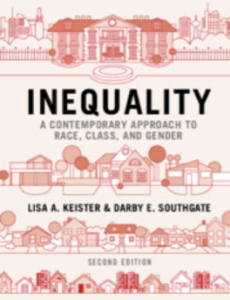 Inequality – A Contemporary Approach to Race, Class, and Gender.
Inequality – A Contemporary Approach to Race, Class, and Gender.
Lisa A. Keister, Darby E. Southgate, CUP, 2022.
Inequality: A Contemporary Approach to Race, Class, and Gender offers a comprehensive introduction to the topics animating current sociological research focused on inequality. Contemporary, engaging, and research-oriented, it is the ideal text to help undergraduate students master the basic concepts in inequality research and gain a deeper understanding of the ways in which race, class, and gender interact with systems of social stratification. Following an introduction to theories and research methods used in the field, the authors apply these concepts.
REGIONAL HUMAN RIGHTS NEWS
The Russian war of aggression against Ukraine ― the broad fundamental rights impact in the EU, the European Union Agency for Fundamental Rights, BULLETIN #2, October 2022.
This second bulletin maps the complexity and scale of the war’s diverse fundamental rights implications right across the EU. It looks at the wide array of issues countries need to address to ensure people’s fundamental rights are upheld. It also draws attention to the plight of vulnerable groups. Furthermore, it identifies good practices for other countries to follow.
This issue covers the following topics:
- Implementing the Temporary Protection Directive – Challenges and best practices
- Initial arrival, information provision, registration and issuance of residence permits
- Access to employment
- Access to accommodation
- Access to social welfare services
- Access to healthcare, mental health care and special needs assistance
- Access to education
- Protection of unaccompanied children and access to guardianship
- Addressing further challenges related to the arrival of displaced persons
- Human trafficking and other forms of exploitation
- Provision of information and support to victims of sexual and gender-based violence
Xenophobic disinformation and hate crime
Opportunities
The Center for Victims of Torture Partnership Opportunity!
IDREAM: Capacity Building for Human Rights Defenders (HRDs) Living in Exile
CVT is accepting applications from Human Rights Defenders (HRDs) living in exile to participate in a dynamic capacity development and mentoring fellowship called “IDREAM.”
IDREAM (Incubator for Defenders Remaining in Exile to Advance Movements) is a collaborative and global capacity development project designed to help address the unique needs of HRDs living in exile. IDREAM will provide training and networking activities with the goals of: advancing advocacy efforts, promoting HRD’s psychosocial resilience and well-being, and improving exiled HRD’s physical and digital security. At the end of the selection process, 10 partner HRDs living in exile around the world will be invited to join IDREAM. The project’s main capacity building activities will take place from approximately April 2023 through November 2024. HRDs selected for IDREAM will receive up to $31,000 in financial assistance to support their work in the project.
The Call for Applications is available in English, French, Mandarin, Arabic, and Spanish. All activities of the IDREAM project will take place in English, and applicants must be proficient in English.
IDREAM invites interested HRDs living in exile outside of their home country or internally displaced within their home country to apply online for this fellowship before the deadline at 11:00 pm CST (23:00 CST) on 30 November 2022.
November Events
5th Peace & Conflict Talk Women – Life – Freedom. Universität Bielefeld
On 16 September 2022, 22-year-old Jina Mahsa Amini was murdered in Tehran after being detained by the Iranian regime’s morality police for not complying with the strict government standards of the mandatory wearing of the hijab. The news of her death sparked outrage in the population of Iran, starting with women protesting the compulsory hijab laws and the treatment of women in general, but soon growing into nation wide protests of a revolutionary nature. International attention and solidarity started, too, resulting in social media campaigns and demonstrations – the latest being a protest in Berlin with an estimated 80.000 participants.
The annual meeting of the Fundamental Rights Platform is approaching fast. Please take a look at the meeting programme and register now to join us on Thursday, 10 November 2022, 13:30-17:00 CET, online as we discuss how civil society can help strengthen the rule of law and what can be done to support civil society organisations in this endeavour.
Leading thinkers and doers from the human rights world will be there to share their insights to inspire and equip you with new ideas and best practices:
- FRA Director Michael O’Flaherty
- European Justice Commissioner Didier Reynders
- Oleksandra Matviychuk of the Centre for Civil Liberties in Ukraine, co-recipient of the Nobel Peace prize 2022
Be there to make your voice heard and opinion count!

Coalition for Academic Freedom in the Americas (español)
Join Scholars at Risk and our partners for an inaugural regional conference on academic freedom in the Americas this November 10th and 11th. The event will take place online and in person, at Universidad de Monterrey, Mexico. The Coalition–led by University of Ottawa’s Human Rights Research and Education Centre, Universidad de Monterrey, and SAR–will bring together civil society, researchers, academics, and students for this hybrid event, which will set the agenda for best practices in protecting and promoting academic freedom in the region.
Peace Psychology and Global Challenges in 2022, 17-19 November 2022, Online
The International Network for Peace Psychology (INPP) is holding its 17th biennial symposium on 17-19 November 2022, online. The theme ‘Peace psychology and global challenges in 2022’ aims to bring together scholars, practitioners, and activists who are committed to promoting peace and social justice through their research and practice to discuss the pressing issues facing our world today. Invited speakers include Prof. Winnifred Louis, Prof. Wilson Lopez, and Prof. Emeritus Dan Christie and Prof. Elizabeth Lira. Presentations may contribute to a special INPP issue of Peace and Conflict: Journal of Peace Psychology.
Symposium streams include: • Young people and peace • Climate change and peace • Psychosocial wellbeing and peace • Culture, religion and peace-building • Social movements and political and social transformation • War, conflict and peace-building
Conference INVITATION ICHRHD2022 Human Rights and Human Dignity Conference.
The (ICHRHD2022) Conference Committee invites you to the International Conference on Human Rights and Human Dignity (ICHRHD2022), taking place from the 20th – 23rd of November 2022 in Boston the United States of America and from the 26th – 30th of November 2022 in Saint Louis – Senegal, under the sponsorship of the ICHRHD2022 Conference Committee .
For details on Registration Contact our Registration Desk Email: registration.IPCRC2022@outlook.com
Webinar on Reproductive Rights
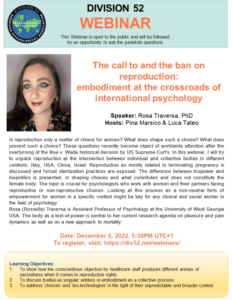
CONTACTS: Published by the Global Network of Psychologists for Human Rights – www.humanrightspsychology.org
Disclaimer: The website of the Global Network of Psychologists for Human Rights (GNPHR) contains articles, events and news about the domain where psychology and human rights intersect. The information presented in this Bulletin, does not imply that the GNPHR shares the views and beliefs in the articles.
- @GNPHR1
- How to get involved – read how you can contribute to the global network
- Consider contributing a Blog/Commentary
- News and Bulletins from the GNPHR – Subscribe to GNPHR
- Email addresses:
Ways to Participate in Global Network Activities
- Student/young person representation on the GNPHR Steering Committee
Are you a student or young person (under 35 years of age) interested in joining the GNPHR Steering Committee? The GNPHR invites applications. Role description: The terms of reference broadly define the roles of all members of the steering group. Individual steering committee member tasks include : Each member will take responsibility for one of the following: (a) A specific content area or group of areas; (b) A specific project (e.g. survey of human rights reporting mechanisms; survey of educational programs in psychology/human rights, etc); (c) A specific function: for example, organizing a newsletter; soliciting commentary or newsletter blogs; seeking grant possibilities; outreach to general human rights organizations; outreach to psychology organizations or (d) Consultation: Working in collaboration with other organisations where there is a specific issue. In addition, from time-to-time, short-term subgroups may work on specific projects. In addition, for the student member, there would be a specific remit to liaise with other organisations that are focussed on younger people, psychology and human rights. Click here if you are interested in being nominated. - Share Your Experiences and Examples
One of the best ways to illustrate the intersection of psychology and human rights is through example. We are looking for examples of your encounters with human rights issues in your professional life. You might describe a time when you protected (or failed to protect) human rights, or advocated for what you saw as a human rights issue. The events might be in your clinical, research, academic, applied, or volunteer work. Please send your narrative / story (500-1000 words) to Marlena Plavšić (marlena_plavsic@hotmail.com). We will compile these for publication in the GNPHR Bulletin and on the website. Please also indicate if you would like your stories to remain anonymous. - Share your Expertise and Opinions
We invite you to contribute a blog or opinion piece on general human rights issues; human rights education or strategies for raising the profile of human rights within psychology or your professional life. Students are welcome to contribute, including on student needs for learning about and addressing human rights. Please contact the GNPHR Blog editor (blogeditor@humanrightspsychology.org) with ideas for the article you would like to write! - Send articles/news/events
If you come across a human rights article or news, or know of an upcoming hunman rights event, please send for publication in the Bulletin. Send to the Bulletin editor Polli Hagenaars (polli.hagenaars@gmail.com).

